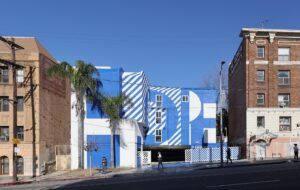
Will Alsop I like Shanghai for example. I go to Shanghai and Beijing every three or four months. I feel very good about Toronto as well. I go there every six or eight weeks. And I was in Moscow for a while. We had an office there and it was nice – but I could never have lived there. I go to Vienna every month to teach but I couldn’t live there … it’s too beautiful and too gossipy. So I’m mainly here.
icon So is London mainly useful for the international airports?
wa I like London, it’s as simple as that! Plus my wife’s here.
icon Were you born here?
wa No, I was born in Northampton. Ever been?
icon No.
wa That’s the problem with Northampton. It’s a funny place. I left there when I was about 19; had quite a lot of friends there. They all headed out to the M1. Some turned turned left and went to London and some turned right to Birmingham. Never saw them again!
icon Why did you choose London?
wa I came to study at the AA in 1968. Which was a good time. London was really good then. I was taught by every member of Archigram.
icon Was the AA the main attraction?
wa I knew if I wanted to be an architect, the AA at that time was the only place to be. It was a two-stage process to get in. Quite frightening. I also applied to St Martins College to do sculpture, which again, at the time was the place to be for sculpture. I thought if the AA didn’t take me I’d do sculpture. But if St Martins didn’t take me I’d be fucked. But luckily they both accepted me so I went to the AA.
icon What was it like being taught by Archigram? Were you thinking a lot about London as a city?
wa I was here to indulge in the general architectural message and at the time there was no better place than London. But the work was not really related to the city. I think for the first three years of study I didn’t design a building at all. I don’t think it’s unreasonable to say that this is the most creative city in the world, but I think we have to be careful about making that claim too vociferously. It encourages other cities to say, “no you’re not”. But by and large it’s true. In my time in London, which is quite a long time, it hasn’t been great. In the late Eighties, early Nineties it took a dip. In ’94, ’95 it became much more interesting again. The Sixties and early Seventies were amazing. Testing new boundaries, new music, poetry, and morals. Then it all became a bit normal, coinciding with the Thatcher years and the rise of the yuppie, which was a London phenomenon. A normality took hold where the younger people where less radical than the generation before them. That was odd.
icon Is this a London or a British phenomenon?
wa I was with Nigel Coates the other day. There are people like him who are doing things that are incredibly British. Let’s celebrate that Britishness. I look at the work of FAT, who are often dismissed by the style police. They’re much more interesting than that. You don’t have to like what they do but you can like the way they do it. With more confidence, what might they go on to?
icon I think of FAT’s work as identifiably from London.
wa I would agree with that. That’s why I encouraged Urban Splash to take them on. And the younger group AOC, they’re interesting. These are not alone. I think Nigel Coates is far more inventive than his opportunities allow him to show. I think his leadership at the Royal College of Art [where Coates is head of architecture] is fantastic. It’s time to celebrate that thing called Britishness because it creates a challenge for all the marvellous foreigners.
icon London is characterised by a resistance to large-scale urbanism. Do you think we’re at a point where certain agendas are preventing interesting things happening?
wa That could be true. Part of the character of London is that it does change rapidly. The real test now is we have two things going on at the same time – the Olympics and the Thames Gateway debate. It could all become very ordinary. On one level, me and some other people get criticised. “That’s just Will getting his rocks off.” But the actual reality is when I do build, and this sounds terribly big-headed and immodest but I’m going to say it anyway, people really fucking love it. They go in their thousands. They’re popular, they generate things. So why do I get criticised? Isn’t that what it’s all for? Three times the number of people than intended read at Peckham Library. That’s good. It’ll wear out, but it’s a nice problem to have. The mayor of Toronto told me tourism has gone up 2.3 per cent because of that building [the Sharp Centre at the Ontario College for Art and Design, 2004]. God knows how they calculated that but I’m quite happy to believe it. The number of people who want to study at that school has doubled. People do respond to architecture and new ways of thinking.
icon Wherever it is?
wa Wherever it is. And London shouldn’t miss out on that. But even though we have the opportunity now in East London now to make new types of urban thinking, I suspect that we won’t.
















